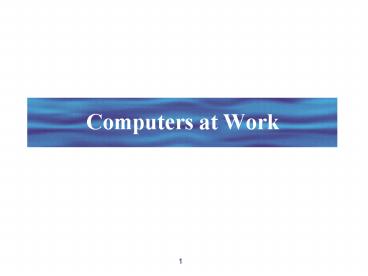Computers at Work - PowerPoint PPT Presentation
1 / 17
Title:
Computers at Work
Description:
... electronic cottage to describe a home where technology allows a person to work at home. ... Doesn't fit those jobs requiring human interaction. Requires ... – PowerPoint PPT presentation
Number of Views:382
Avg rating:3.0/5.0
Title: Computers at Work
1
Computers at Work
2
Into the Information Age
- Paradigm shifta change in thinking that
resultsin a new way of seeing the world. - Three Major Changes
- The Agricultural Economy
- The Industrial Economy
- The Information Economy
- Technology was central to each of these
transformations.
3
Entertainment
- Digital CD, DVD, TV, Movies.
- Easy to dub foreign languages
- Easy to change/remove scenes for different
cultures - Does not wear out or reduce in quality no mater
how many times it is run, - All digital movies can be sent to every theater
4
News
- The newspaper/TV industry has been radically
transformed by computer technology. - Reporters scan the Internet for facts, write and
edit stories on location using notebook
computers, and transmit those stories by
satellite or modem to central offices. - During the Iraq war, reporters sometimes used
satellite cell phones when normal communications
were down. - Photo retouchers use computers instead of
brushes and magnifying glasses to edit
photographs.
5
Medicine
- High-tech equipment plays a vital role in the
healing arts. - Non evasive surgery
- Reduced time for recovery
Medical students and professionals use this
virtual emergency room to simulate processes of
collecting vital signs and other patient data.
6
Airlines
- Without computers, todays airline industry
simply wouldnt fly. - Now fly by wire
A flight simulator might have a graphical user
interface that makes the computer screen look and
act like the instrument panel of a real plane so
that it can be run interactively by human pilots.
7
Science
- From biology to physics, every branch of science
has been changed by the computer.
A botanist can enter and analyze data in remote
locations.
Scientists could not have cracked the DNA genetic
codes without a super computer.
8
The Automated Factory
- In the modern automated factory robots are used
for painting, welding, and other repetitive
assembly-line jobs. - Computers use RFID tags to help track inventory,
time the delivery of parts, - Control the quality of the production, monitor
wear and tear on machines, and schedule
maintenance.
9
CAD and CAM
- Engineers use CAD (computer-aided design) and CAM
(computer-aided manufacturing) technologies to
design new products and the machines that build
those products.
10
The Electronic CottageVirtual Office
Futurist Alvin Toffler popularized the term
electronic cottage to describe a home where
technology allows a person to work at home.
- Telecommuting may allow us to redefine the
issues so that were not simply moving people to
work but also moving work to people. - Booth Gardner, former Washington governor
11
(No Transcript)
12
Telecommuting
- Arguments for
- Reduces the number of automobile commuters, thus
saving energy, reducing pollution, and decreasing
congestion - Saves time
- Allows for a more flexible schedule
- Can increase productivity
- Happier because more time with family
- Emphasis on product (results) rather than process
13
Telecommuting
- Arguments against
- Doesnt fit those jobs requiring human
interaction - Requires self-discipline (workaholic)
- Office social life missing
- Low visibility
- Other Reasons Pro and Con
Most telecommuters report that the ideal work
situation involves commuting to the office 1 or 2
days each week and working at home on the others.
14
Productivity and People
- All too often computers are introduced into the
workplace without any consideration of the way
people work and interact. - Workers expected to adjust to unyielding systems
- User training and support often inadequate
- Teachers are given tools, but little training
- Office workers given computer and little to no
training
15
Electronic Sweatshops
- A data-entry shop might contain hundreds of
clerks sitting at terminals in a massive,
windowless room. - Workers are paid minimum wage to do boring,
mindless keyboarding. - Many experience headaches, backaches, serious
wrist injuries (carpal tunnel syndrome), stress,
anxiety, and other health problems
16
Employment and Unemployment
- Will we need a New Economy?
- The average workweek 150 years ago was 70 hours
for the last 50 years it has been steady at about
40. - European workers work less hours and have more
vacation time. - Should governments and businesses encourage
job-sharing and other systems that allow for
less-than-40-hour jobs? - What will people do with their time if machines
do most of the work? What new leisure activities
should be made available? - How will people define their identities if work
becomes less central to their lives?
17
(No Transcript)































